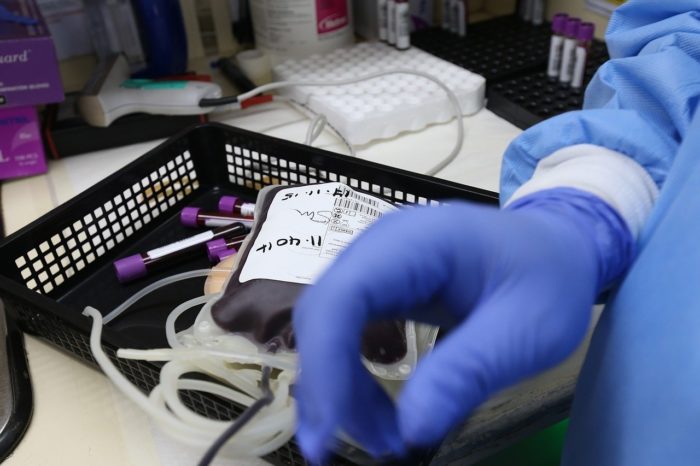The Complete Guide
How to Become a Phlebotomist
Phlebotomist guide to save time and money on your certification

Why We Love Phlebotomy Tech
What if you could be on the frontlines of saving countless lives but without the need (or expense) of going to medical school for 4+ years? And what if, instead, you could get going on this new and exciting career in as little as 4 months?
Phlebotomists (aka Phlebotomy Technicians) are responsible for drawing and collecting blood samples from patients. And since blood is the very source of human life and carries our human genetic code, handling it is a very big responsibility.
These phlebotomy technician professionals are instrumental in providing quality patient care and are a critical component of any healthcare team.
If you think you have what it takes to become a phlebotomy technician, have fine motor skills and you feel excited to take on this role, then keep reading to see what this career offers in 2023!
What Do Phlebotomy Technicians Do?
A phlebotomy technician or phlebotomist is a specialized medical assistant that collects blood and sometimes other tissue samples to be used for analysis by laboratory workers.

Besides drawing blood samples and sample preparation, these professionals are also often responsible for containing and disposing of hazardous equipment, documentation of patient records and management of timed collections.
Phlebotomists also use soft skills to help calm people before their blood draws. A well-trained and skilled phlebotomist is able to keep up with the pressures of working in a fast-paced environment, and yet still keep a calm demeanor to help ease patient anxiety.
So let’s say you work in a hospital emergency room. A patient comes in complaining of nausea and dizziness. After they’ve been triaged and brought back to an exam room, you will be notified that a new patient requiring a blood draw has arrived.
You would be in a position to help put this patient’s mind at ease, prepare them to draw blood, then take their sample, and lastly, prepare to send it down to the lab.
If you fully understand the tasks above, then you know that professionals are a very important part of the healthcare team, directly assisting in patient care and thereby, ensuring a smooth workflow throughout the day. No wonder the demand for phlebotomy technicians is booming!
7 Reasons to Become a Phlebotomy Technician
There are a myriad of benefits for this profession, but here are the top 7 reasons you should consider a career as a Phlebotomy Technician:

1. No Prior Experience is Needed
No prior experience or degree is required to get started in this new career. That makes it even more attractive. You could become certified and be on your way in as little as 6 months.
Usually entering the medical industry means spending years as well as investing a lot of funds in your education. We bring you many other ways, faster and less expensive to start your career in an extremely rewarding way. With a tough economic situation ahead, these career options can be a great option to consider.
2. Career Advancement
A phlebotomy technician is an excellent entry-level position in the healthcare industry because it exposes you to a variety of other healthcare careers. Working in this position can also help with networking in the industry as well as exposing to other career options.
Many phlebotomists move on to other allied health careers or move up the ranks in their own sector through specializations such as donor phlebotomy technicians or phlebotomy specialists.
3. Secure Job Market and Great Pay
Experts predict we will see a large uptick in job growth over the coming years for phlebotomy technicians. With the economy and people struggling with job security and opportunity, this can be a very important factor.
And this entry-level position can earn above-average pay. But we’ll get to specific data on pay and prospects in just a bit.
4. No Dull Workdays
If the idea of sitting in a cubicle staring at a computer monitor doesn’t sound appealing, then this profession may be a perfect fit. No two days are ever alike, and you get to work with a variety of people.
And, if you like the idea of working in an exciting and fast-paced environment, then you might like to work in a hospital. There is also the element of dealing with something new every day as well as interacting with people and helping them through the process. These experiences are quite fulfilling.
5. A Physically Active Job
You also don’t have to worry about sitting all day, which studies have found is very unhealthy. Phlebotomy techs are on their feet much of the day, moving from patient to patient and this helps with maintaining a healthy lifestyle.
So, if you are looking for a physically active career, this may be a great option for you.
6. You Will Often be a Superhero
It can often be incredibly difficult to locate a vein for a blood draw or to just help patients through the process. If you’re one of those techs who have particularly strong skills, are detail-oriented, have a calm demeanor, and are good at handling people, you may become like a superhero to patients and the rest of the staff and get the job done!
7. Save Lives by Drawing Plasma
Blood donations are vital and help millions of Americans get through medical emergencies. Phlebotomy techs safely and accurately tackle these donations, with all the safety precautions, while comforting the donors.
In this way, they are on the very front lines of saving lives. In a nutshell, Phlebotomy techs are the unsung heroes of our healthcare system, working tirelessly behind the scenes to ensure that life-saving blood is available for those who need it most.
How to Get a Phlebotomy Technician Certification
Whether you work in a hospital, nursing home, or private doctor’s office, employers typically like to see candidates that have been certified.
Certification demonstrates you have gained the knowledge needed to perform your duties well. So a certification may be the best way to get started in this exciting new career.
We recommend you take our certification savings quiz to get started.
Take the Quiz! >
Our quiz could help you save time and money on a certification program from an authorized school or accredited university – and it takes less than a couple minutes to complete.
5 Things to Look for In A Phlebotomy Tech Certification Program
1. Find an online Phlebotomy Technician program from an authorized school or university
To ensure your new career is successful, it is highly recommended that you gain certification through an accredited university.
Not only will you gain the necessary skills and knowledge, but once completed, you’ll have a certificate to proudly display on your wall.
2. Look for a discount and a low monthly payment plan
Finding schools that offer these financial benefits is not always easy. But they are out there…don’t worry, we help you find them! 🙂
And to make your life easier, OnlineDegree.com has partnered with top schools and universities in the country to offer adult learners an affordable education.
3. Make sure an externship placement is included
Without question, gaining some hands-on experience is one of the best ways you can set yourself apart from other candidates and land that job!
Employers value candidates who have practical experience in the field, as it demonstrates their knowledge, skills, and ability to perform the job effectively.
4. Look for an online, mentor-supported course you can take at your own pace
An online education will make it incredibly easy for you to earn your certification at your own pace and on your own schedule. Plus, you’ll get the help and mentorship you need when you need it!
This is key to maintaining family time and current work responsibilities as you get ready for your new career without losing balance.
5. Find out if textbooks are included in the cost of the program
Phlebotomy Tech textbooks can be expensive! Make sure to find a program that doesn’t charge extra for books.
6. (Bonus!) Use our free quiz to find a certification program that meets all of these criteria
You can either research universities yourself to find the ones that meet all of these criteria, or you can save time by taking our short healthcare quiz.
In less than 5 minutes you can be matched with the best certification programs that align with your career goals and life situation.
Phlebotomy Technician Salary Data
How much do Phlebotomy Technicians make?
Here is the salary and growth data from the Bureau of Labor Statistics (BLS):

According to the BLS, the median annual wage for phlebotomy technicians was $37,380 or $17.97 mean hourly wage in 2021. This number can be influenced by a variety of factors such as location, hours worked, and certifications.
Also, phlebotomy techs can earn more depending on the industry they work in. As an example, a phlebotomist working in a diagnostic laboratory may earn an annual salary of $38,040 while a tech working in an outpatient care center may earn as much as $41,620.
Most phlebotomists work full time. Phlebotomists who work in hospitals and labs may need to work nights, weekends, and holidays.
Phlebotomy Technician Job Growth Projections and Forecast
How fast is the Phlebotomy Technician field growing?
According to the BLS, the employment of these professionals is expected to grow 10% from 2021 to 2031. That is far faster than the average for all occupations.

Blood analysis will always remain an essential function in medical laboratories and hospitals. And with an aging baby boomer population, more patients will require lab work, requiring a greater need for phlebotomy technicians.
Moreover, in the past couple years we have seen the world going through a pandemic crisis and all sorts of medical emergencies, making the need for phlebotomy technicians even greater.
While job prospects are good for all candidates, the BLS has stated that those who obtain certification will have excellent job prospects. Luckily we can connect you with schools that offer this training!
How to Find a Job as a Phlebotomy Technician
Your first step toward your career as a phlebotomy tech is to complete the certification training program through an authorized school or accredited university.
This will ensure a solid educational foundation and get you ready to enter the job market.

Next, you’ll want to take some time to think about the work environment you’d most like to work in. Many phlebotomy technicians work in doctor’s offices and hospitals, but you may also find employment in:
- Blood donation centers
- Clinical laboratories
- Community health centers
- Community health drives
- Military settings
- Nursing homes and rehabilitation centers
- Research centers
Once you’ve determined your preferred work setting, your next step is to gain some critical hands-on experience before hitting the proverbial pavement.
A real-world experience is important for developing skills based on the training gained through certification. The good news is a quality certification program will include an externship so you can gain some hands-on experience!
Frequently Asked Questions
Additional questions and answers you may have about becoming a Phlebotomy Technician and getting certified

Q: What Does a Phlebotomy Technician Do Every Day?
A: A phlebotomy tech is responsible for drawing blood samples from patients for tests, transfusions, research, and blood donations.
Beyond this, they are also responsible for assembling and maintaining medical instruments, and keeping everything clean and sanitary. They will also typically help to keep accurate patient records.
Q: What is a Phlebotomy Technician Certification?
A: A Phlebotomy Technician Certification is a valuable asset to have as it shows prospective employers that you have taken the time and initiative to receive proper training. Certification can go a long way in helping you get prospective employer attention.
Q: What Skills Will I Learn in Phlebotomy Technician Training?
A: Your focus will be on performing venipuncture blood draws. To start though, you will learn the fundamentals of anatomy and physiology. You will also be trained on how to safely and properly use essential equipment and supplies.
Q: What Are the Prerequisites for Enrollment in a Certificate Program?
A: The only requirement for enrollment in these programs is a high school diploma or equivalent.
How to Start Towards a Phlebotomy Technician Career In 4 Months
Even if you have no prior experience or degree – you may still start towards a career as a phlebotomy tech in only 2-4 months! That’s one of the greatest advantages of this profession.

So here’s what we recommend you do to get started: Take this quiz to see if you qualify for an online certification program from an accredited university or authorized school.
A phlebotomy technician certification is required or preferred by most employers. Plus, taking a certification program could be the best way to get your foot in the door, build your network, get training, and work experience.
Take this quiz to see if you qualify for:
- 10% Off A Certification Program
- An Externship For Real Work Experience
- Affordable Programs and Low Monthly Payments
- No Extra Cost For Textbooks – All Included and Shipped To Your Door
- Online, Mentor Supported Courses You Can Take 24/7 At Your Own Pace
If you are ready to get started on an exciting and rewarding career in healthcare, then take this short quiz to get started toward your dream!

















